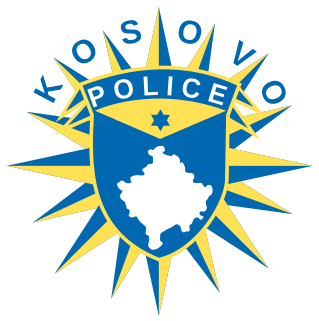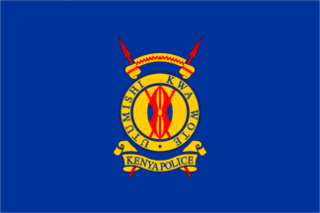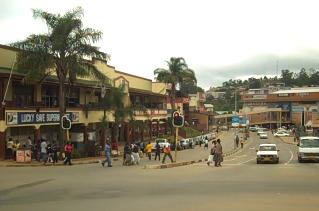
Hhohho is a region of Eswatini, located in the north western part of Eswatini from the north and running southwards to the centre, Hhohho was named after the capital of King Mswati II, who expanded the Swazi territory to the north and west, taking in the districts of Barberton, Nelspruit, Carolina and Piet Retief. These areas were later acquired by what was the Province of Transvaal and today they form part of the Mpumalanga Province of South Africa. It has an area of 3,625.17 km², a population of 320,651 (2017), and is divided into 14 tinkhundla. The administrative center is the national capital of Mbabane. It borders Lubombo Region on the southeast and Manzini Region in the southwest.

Kosovo Police is the policing law enforcement agency of Kosovo.

Lobamba is the traditional, spiritual, and legislative capital city of Eswatini, seat of the Parliament, and residence of the Ntombi, the Queen Mother. Mswati III lives about 10 kilometres (6.2 mi) away at the Lozitha Palace. The King and Queen Mother participate in annual December and January Incwala ceremonies and August and September Reed Dancees at the Royal Kraal.
In Brazil, the Federal Constitution establishes five law enforcement institutions: the Federal Police, the Federal Highway Police, the Federal Railway Police, the State Military Police and Fire Brigade, and the State Civil Police. Of these, the first three are affiliated to federal authorities and the latter two subordinated to state governments. All police institutions are part of the Executive branch of either federal or state government. Apart from these five institutions there is another one which is affiliated to municipal authorities: the Municipal Guards. The Municipal Guards de jure is not considered a public security force, but federal law 13,022 gave them de facto police attributions.

The Kenya Police Service is a national body in charge of law enforcement in Kenya. It is subordinate to National Police Service which is headed by Inspector General of Police who exercises independent command over the Service. Kenya Police is headed by Deputy Inspector General. Kenya Police is further divided into Service Headquarters, Formations, Regional Commands and Training Institutions. Regional commands in turn divides its force into County, Sub-County Commands, Police stations and Police Posts in that hierarchy. All these elements report to a Kenya Police Headquarters in Nairobi.
Law enforcement in Azerbaijan comes under the control of the Ministry of Internal Affairs of Azerbaijan, which administers the National Police of the Republic of Azerbaijan. Admitted to the Organization for Security and Co-operation in Europe (OSCE) on 30 January 1992, with an OSCE office opening in Baku on 16 November 1999, and as a member of INTERPOL, the National police force is well integrated into the law enforcement network of European countries.

Law enforcement in Saint Lucia is the responsibility of the Royal Saint Lucia Police Force (RSLPF), which was founded in 1834.
The Royal Barbados Police Force (RBPF), as established under the Police Act, of 1961(a), and the Constitution of Barbados is a part of the government responsible for local law enforcement. Tyrone Griffith is currently Commissioner of the Police. The RBPF is divided into three territorial divisions, the Operations Support Division, the Administrative Support Division and the Criminal Investigations Division. The organisation structure of the RBPF is modelled after London's Metropolitan Police Service.
Law enforcement in Mali is the responsibility of the National Police Force, which is subordinate to the Ministry of Internal Security and Civil Protection. The National Police Force shares responsibility for internal security with the Gendarmerie, a paramilitary organization; the police are responsible exclusively for urban areas, while the Gendarmerie's primary responsibility is for rural areas, though it may also reinforce the police when needed. According to The Wall Street Journal, each organization has approximately 5,000 personnel, while Interpol gives a figure of over 7,000 for the police.

Law enforcement in Ethiopia is dealt with by the Ethiopian Federal Police at federal level and by regional police commissions in the Regions of Ethiopia. The Ethiopian Federal Police (EFP) was established in 1995 to serve the public, to ensure the observation of human and democratic rights and to maintain the safety and welfare of the public. Its stated duties are the enforcement of laws and safeguarding constitutional guarantees, the prevention, detection and investigation of crime, the coordination of national state police commissions and development of national policing standards. The EFP also has to provide operational support to regional police commissions.
However, local militias also provide local security largely independent of the police and the Ethiopian military. Corruption is a perennial problem, particularly among traffic police who solicited bribes.
The U.S. Department of State states that its contacts within the Ethiopian government report that the findings of investigations into abuses by local security forces, such as arbitrary detentions and beatings of civilians, are rarely made public. However, the Ethiopian government continued its efforts to train police and army recruits in human rights. During 2008 the government is seeking assistance from the International Committee of the Red Cross, the local non-governmental organization Prison Fellowship Ethiopia (JFA-PFE), and the Ethiopian Human Rights Commission to improve and professionalize its human rights training and curriculum. The JFA-PFE provided human rights training for police commissioners and members of the militia in 2008.
There are a handful of law enforcement establishments in the Maldives.
The Sierra Leone Police (SLP) is the national police force of the Republic of Sierra Leone, that is primarily responsible for law enforcement and crime investigation throughout Sierra Leone. The Sierra Leone Police is part undet the jurisdiction of the Sierra Leone Ministry of Internal Affairs, a cabinet ministry in the Government of Sierra Leone.
Education in Eswatini begins with pre-school education for infants, primary, secondary and high school education for general education and training (GET) - and universities and colleges at tertiary level.

The Nigeria Police Force is the principal law enforcement agency in Nigeria with a staff strength of about 371,800. There are currently plans to increase the force to 650,000, adding 280,000 new recruits to the existing 370,000. The NPF is a very large organization consisting of 36 State commands grouped into 12 zones and 7 administrative organs. The agency is currently headed by IGP Adamu Muhammed.

The Maldives Police Service is the civilian national police force of the Republic of Maldives. It is responsible for enforcing criminal and traffic law, enhancing public safety, maintaining order and keeping the peace throughout Maldives. The organization comes under the control of the Ministry of Home Affairs.

The Law enforcement in Cape Verde is carried out by the Judicial police.

The Saint Petersburg Police, officially the Main Administration for Internal Affairs of the City of St. Petersburg and the Leningrad Oblast is the state police force of Saint Petersburg and Leningrad Oblast, Russia. The main responsibilities of the service are the internal security, protection of human rights and freedoms, suppression and detection of crime, and protection of public order.
Law enforcement in the Kyrgyz Republic is primarily the responsibility of the Ministry of Internal Affairs. The ministry commands the police force, also known locally as militsiya, directly and thus policemen carry the insignia of the ministry (ИИМ). This structure of law enforcement is similar to its predecessors and many other post-Soviet states. The ministry is subdivided into numerous departments that tackle the different aspects of law enforcement in the Kyrgyz Republic and is also supported simultaneously by other governmental agencies. The police is contactable via the emergency hotline number 102.














